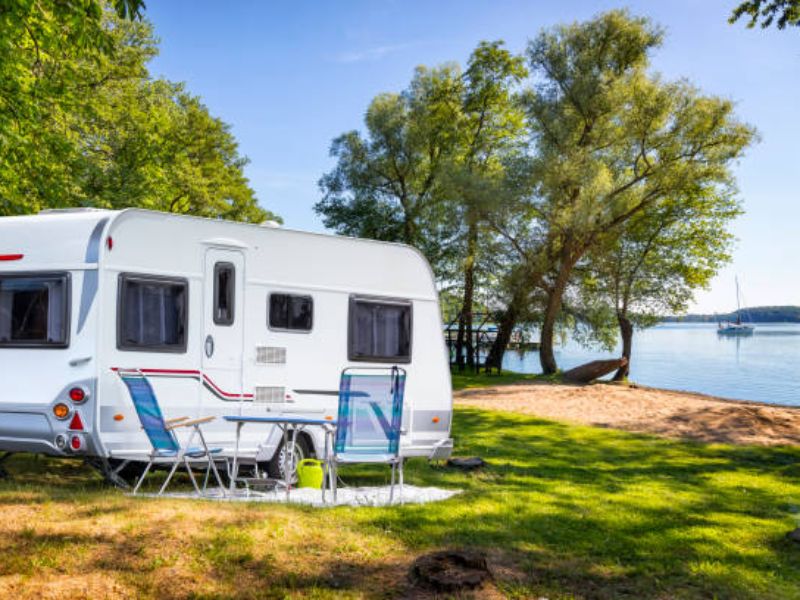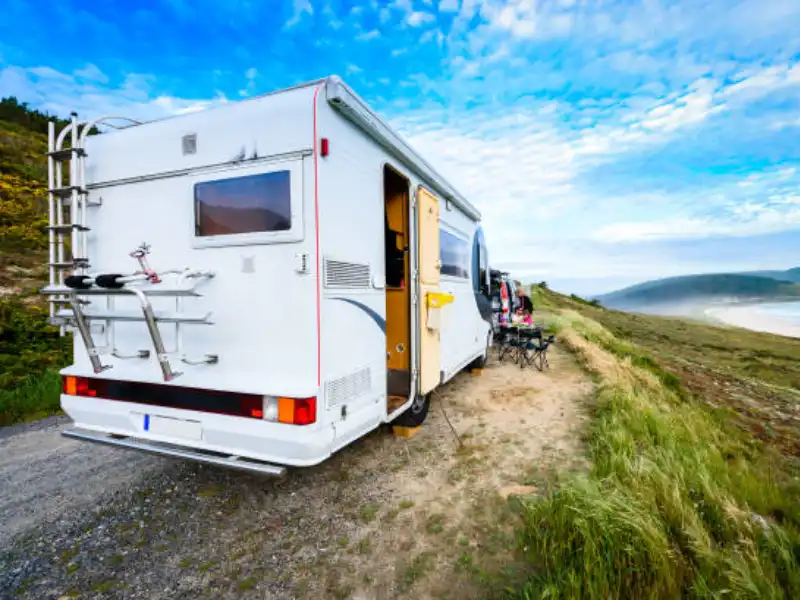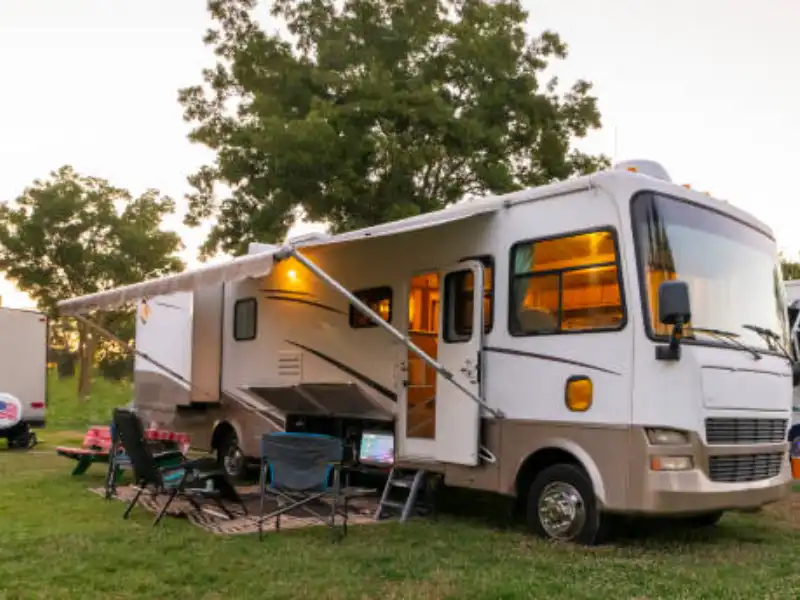Understanding Lithium Battery
Lithium batteries have taken the world by storm due to their superior performance, safety features, and longevity. Unlike traditional lead-acid batteries, lithium batteries leverage the potential of lithium, the lightest metal known to humanity. There are various types of lithium batteries in the market, with Lithium Iron Phosphate (LiFePO4) batteries being the preferred choice for caravans due to their stability, performance, and safety. The core component of a lithium battery is the lithium cell, which acts as a reservoir of the stored electrical charge.
At the heart of a lithium battery for caravans is a built-in Battery Management System (BMS), which monitors and manages battery operation. The BMS controls functions like voltage regulation, discharge control, thermal management, and energy storage, enhancing the battery life and performance while ensuring safety. The BMS is responsible for regulating the volt output of the battery, ensuring that it remains within safe limits.

Caravans Battery Requirements
Selecting the right battery is crucial for powering a caravan and determining the quality of the off-grid experience. Caravans have unique power demands and space constraints that necessitate batteries with high energy density, lightweight and compact design, rapid recharging, and advanced safety features. Lead-acid batteries, while inexpensive, are a poor choice for caravans as they are heavy, occupy considerable space, and have limited usable capacity.
Lithium iron phosphate batteries are the ideal technology for caravans today thanks to their superiority in all key metrics. To start, caravans require batteries with high depth of discharge ratings, allowing regular deep cycling without damage. Lithium iron can safely discharge 80-90% of its capacity repeatedly, versus just 50% for lead batteries. Caravans also benefit greatly from lithium’s energy density of 120-160Wh/kg versus lead’s 30-50Wh/kg. This provides far more usable onboard power for lights, pumps, fridges and electronics without adding bulky weight. Fast recharging of 1-2 hours from AC mains also enhances the appeal of lithium when connected to power.
Lastly, lithium batteries excel in safety, with battery management systems that prevent issues like shorts, overheating and overcharging. The lithium iron phosphate chemistry is also innately non-flammable. For caravan owners, the 10+ year lifespan, maintenance-free operation, and improved efficiency of lithium iron make it well worth the higher upfront cost compared to dated lead acid alternatives when considering the total cost of ownership. Lithium batteries allow caravans to be operated reliably off-grid for extended periods, enhancing the experience greatly.
Why Lithium Batteries Are the First Choice for Caravans?
Lithium batteries have rapidly become the first choice for caravan owners worldwide. The high energy density of lithium batteries allows them to store a significant amount of power in a small, lightweight package, making them ideal for caravans where space and weight are crucial considerations.
What Are The Key Benefits of Using a Lithium Battery for Caravans?
Using a lithium battery for caravans comes with a myriad of benefits.
- Greater Energy Density: Lithium batteries pack a lot of power in a compact size. This higher energy density means you can store more power without taking up extra space in your caravan.
- Excellent Depth of Discharge: Unlike AGM batteries, which typically only provide 50% of their capacity as usable power, lithium batteries allow for nearly 100% discharge. This essentially doubles your usable power supply, enabling you to run your appliances for longer periods.
- Longevity: High-quality lithium batteries often boast a lifespan of up to 10 years or more, outliving AGM or lead-acid batteries by several years. This longevity offers excellent value for your investment.
- Faster Charging Times: Lithium batteries can accept higher charge rates, which results in faster recharging times. This is particularly beneficial when using solar panels for recharging, allowing you to capitalize on sunlight efficiently.
- Built-in BMS: A built-in Battery Management System (BMS) oversees the battery’s operation, enhancing its performance, longevity, and safety. The BMS safeguards the battery from potential issues like overcharge, over-discharge, overheating, and short circuits.
- Eco-Friendliness: Compared to lead-acid batteries that contain hazardous materials like lead and acid, lithium batteries are a more eco-friendly choice, aligning with sustainable practices.
In conclusion, lithium batteries offer the best value and a significant upgrade over traditional AGM or lead-acid batteries, making them the preferred choice for powering your caravan.

Why Lithium Batteries are More Efficient for Your Caravan?
Lithium batteries for caravans offer remarkable efficiency for a variety of reasons. Firstly, they can maintain a steady voltage output throughout their discharge cycle. This constant voltage supply ensures that your caravan appliances receive a steady flow of power, enabling them to operate at optimal performance until the battery is completely discharged.
Furthermore, lithium batteries exhibit minimal Peukert’s effect, which means that they can deliver their full-rated capacity even at high discharge rates. In contrast, the capacity of AGM or lead-acid batteries reduces significantly at high discharge rates, leading to a lower usable power supply. When using lithium batteries, it is important to have a reliable battery charger to ensure optimal performance.
Another key efficiency aspect is the charging process of lithium batteries. They can be charged rapidly and don’t require the time-consuming absorption phase that AGM and lead-acid batteries do, saving you valuable time during recharges.
How Lithium Batteries Enhance Your Caravan Off-Grid Experience?
Using a lithium battery for your caravan can greatly enhance and improve your overall off-grid camping and travel experience in multiple ways. Lithium batteries have a very high energy density compared to other battery chemistries, meaning they can store a large amount of power in a small, lightweight package. This gives them the ability to run caravan appliances like lights, small refrigerators, and electronics for extended periods of time without needing frequent recharges. Their deep cycle discharge capability also allows them to be drained down to very low charge levels repeatedly without damage, ideal for off-grid use.
Furthermore, lithium batteries can efficiently store and harness solar energy from attached photovoltaic panels. This provides a renewable and sustainable power source to keep your battery charged while off-grid. With the battery connected to a power inverter, you can then run higher-draw AC appliances like laptops, induction cooktops, TVs, and even small air conditioners. This gives you access to many modern conveniences while still remaining entirely off-grid.
In summary, lithium batteries unlock the potential for a comfortable, technologically-connected off-grid caravanning experience. Their high capacity, deep cycling ability, solar integration, and AC power delivery allow you to stay off-grid longer without sacrificing modern amenities and appliances. This gives you the freedom to explore remote areas while still enjoying many comforts of home.

Lithium Batteries vs. AGM Batteries
| Feature | Lithium Batteries | AGM Batteries |
| Energy density | Very high (100-265 Wh/kg) | Moderate (30-50 Wh/kg) |
| Cycle life | Very high (2000-5000 cycles) | Moderate (400-800 cycles) |
| Charge efficiency | Very high (up to 99%) | Moderate (85-95%) |
| Self-discharge rate | Very low (2-3% per month) | Low (3-4% per month) |
| Operating temperature range | Wider (-20°C to 60°C) | Narrower (0°C to 50°C) |
| Initial cost | High | Moderate |
| Maintenance requirements | Very low | Moderate |
| Depth of discharge | Can handle very deep discharges (80-90%) | Less deep discharge (50%) |
| Safety | More stable chemistry | Can spill electrolyte if cracked |
| Weight | Lightweight | Heavier |
| Environmental impact | Lower | Contains lead and acid |
| Charge time | Very fast (1-2 hrs) | Slower (8-16 hrs) |
| Lifespan | Longer (up to 10 yrs) | Shorter (4-5 yrs) |
Comparing lithium batteries with AGM batteries highlights why the former is the superior choice for caravans. AGM batteries are significantly heavier than lithium batteries, which can add unnecessary weight to your caravan. For instance, a 100Ah AGM battery weighs (learn: How Much Does a Marine Battery Weigh?) around 30kg, whereas a 100Ah lithium battery weighs just about 12.5kg, contributing to greater efficiency and fuel economy for your caravan.
In terms of usable capacity, AGM batteries can only safely use around 50% of their rated capacity, while lithium batteries can use nearly 100%. Furthermore, lithium batteries boast faster charging times, longer lifespan, and better performance in extreme temperatures, making them the clear winner in this comparison.
Secondly, lithium batteries exhibit a low Peukert’s rating. In layman’s terms, they are significantly less affected by high current loads, meaning they can power heavy-draw appliances like air conditioners or induction cooktops with greater efficiency than AGM or lead-acid batteries.
Lastly, lithium batteries have negligible self-discharge. This means that they won’t lose a significant portion of their stored charge when not in use, making them ideal for caravans that aren’t used all the time.

Source: 24V 200Ah Lithium Bluetooth Battery BL24200
What Is the Optimal Capacity of Caravan Lithium Batteries?
The optimal capacity of your caravan’s lithium battery depends on your specific energy needs (learn: A Good Lithium Marine Battery: What You Need to Know). As a rule of thumb, it’s better to overestimate your power needs than to underestimate them. An optimal lithium battery for most caravans typically ranges from 100Ah to 200Ah.
The capacity of the lithium battery directly impacts the number of appliances you can run and for how long. For example, a 100Ah battery can theoretically deliver 5 amps for 20 hours. However, it’s important to consider your energy usage, including lights, refrigerators, chargers, heating, and other appliances.
For those planning extended off-grid adventures or using power-intensive appliances, investing in a higher capacity lithium battery or a secondary battery pack would be a wise decision.
What Are the Charging Methods of Lithium Battery?
- Mains Power Charging:
The fastest and most convenient way to charge, when hooked up to AC mains power. Lithium batteries can accept very high charge rates from mains, generally fully charging in 1-2 hours.
- Inverter Charging While Driving:
Uses the car’s alternator to generate power while driving, which is converted by an inverter to the correct voltage to charge the lithium battery.
Charge rates are limited by the output of the alternator, resulting in longer charge times. Generally used to top-up the battery while driving, not fully recharge.
- Solar Charging:
Uses solar panels mounted on the caravan to generate power and charge the battery.
Requires a solar charge controller to regulate the input voltage and current to safely charge lithium batteries.
Charge rate depends on solar panel size and sunlight exposure. Allows for indefinite off-grid charging but can be slow in low sunlight.
All charging methods connect to the lithium battery’s built-in Battery Management System (BMS).
The BMS controls vital safety functions like cell balancing and prevents overcharging or excessive discharge rates. This protects the lithium battery from damage during charging.
Regular and full recharging is recommended for lithium batteries to maximize their lifetime and capacity (learn: What Is Good About HDN Lithium Battery?). Mains charging delivers this most efficiently when accessible.
What to Consider when Choosing a Lithium Battery for Your Caravan?
- Evaluate power needs and required battery capacity: Consider the appliances you want to run – lights, fridge, pumps, electronics, etc. Calculate the total expected power draw to determine the ideal battery storage capacity in kilowatt-hours. Choose a battery that meets or exceeds this capacity.
- Consider physical size and weight: Lithium batteries are compact but can still take up valuable space. Measure your available storage area in the caravan to ensure the battery dimensions fit. Also consider the weight, as heavier batteries reduce cargo capacity and increase fuel consumption. Select the lightest battery that meets your capacity needs.
- Battery lifespan and cycle life: Look for batteries with a long lifespan – quality lithium batteries can deliver up to 10 years of service life. Cycle life indicates how many full charge/discharge cycles it can handle – aim for at least 2000 cycles. Higher figures deliver better long-term value.
- Built-in battery management and safety features: A good BMS (battery management system) is essential – this protects the lithium cells from damage and controls safe charging/discharging. Also, look for overcharge, short circuit and high temperature protection. Safer batteries reduce the risk of hazards.
- Warranties and brand reputation: Reputable lithium battery brands offer warranties of 5 years or longer. This guarantees replacement batteries if faults occur. Stick to established manufacturers with a proven reputation.
- Cost and value comparison: Consider the upfront cost vs the long-term value. More expensive lithium batteries can work out cheaper in the long run due to their extra longevity and usable capacity.
How to Install a Lithium Battery in Your Caravan?
- Disconnect and remove the old battery: Switch off all power draws and isolate the old battery. Carefully disconnect the terminals, removing the negative first. Lift out the old battery safely.
- Select an appropriate location: Find a secure place to mount the lithium battery, preferably inside an existing vented battery box. It should be protected from weather and mechanical damage.
- Physically install the lithium battery: Use mounting bolts/straps to securely fix the battery in place, ensuring minimal vibration or movement. Maintain ventilation around the battery.
- Connect the power cables: Identify the positive and negative terminals. Connect the positive (red) cable first, followed by the negative (black). Use suitably rated cables and terminals. Apply dielectric grease.
- Connect the BMS: Plug in the Battery Management System wiring to the lithium battery. This enables monitoring and protection of the battery.
- Complete electrical connections: Connect all other electrical wiring as required, such as solar input, alternator input, and DC output to fuses/inverter.
- Test and validate the installation: Check battery voltage, charge/discharge function, and power all appliances to validate correct operation. Recheck connections for tightness.
- Understand maintenance needs: Lithium batteries require minimal maintenance. However, check cell balancing, inspect terminals periodically, keep surfaces clean, and avoid excessive vibration.

How Long Does a Lithium Battery Last in a Caravan?
The lifespan of a lithium battery in a caravan depends on various factors, including the quality of the battery, usage patterns, and maintenance. However, high-quality lithium batteries typically last up to 10 years or more under optimal conditions, significantly outlasting traditional AGM or lead-acid batteries (Relevant Article: How Long Do Golf Cart Batteries Last).
It’s worth noting that the number of charge and discharge cycles a battery can handle before its capacity starts to degrade also affects its lifespan. Lithium batteries can often handle thousands of cycles, thanks to their robust construction and the built-in Battery Management System (BMS) that protects them from damaging conditions.
How to Maintain Caravan Batteries?
- Monitor voltage periodically: Check the battery voltage at least monthly. This helps identify any issues with charging/discharging performance or deteriorating battery health.
- Keep the terminals clean: Clean the battery terminals every few months using a wire brush or sandpaper. Remove any buildup of dirt or corrosion to maintain optimal electrical connections.
- Inspect wiring and connections: Look for cracked cables, loose connections, or corroded wires. Tighten connections and replace damaged cables immediately to prevent hazards.
- Avoid overheating: Park the caravan in shaded areas or use reflective window shades to keep the interior and battery compartment cooler in hot weather. Overheating degrades lithium battery life.
- Insulate in cold weather: In very cold conditions, wrap or blanket the battery to prevent it from getting too cold. Extreme cold reduces performance. The battery itself should have a low temperature cut-off.
- Check the charge level: Don’t let the battery stay in a low state of charge for extended periods. Recharge it at least every 2-3 months if storing the caravan.
- Load test periodically: Test the battery under load every 6 months by running appliances like lights. This verifies it is performing to its rated capacity.
- Keep the BMS up to date: Make sure the Battery Management System has the latest firmware installed. This provides optimal monitoring and protection.
- Follow usage guidelines: Adhere to the recommended usage and maintenance from the manufacturer to maximize battery life. Proper care ensures years of service.
Are Lithium Batteries for Caravans Safe to Use?
Lithium batteries designed specifically for caravan applications utilize multiple levels of safety protections that make them very safe to use when properly installed and maintained.
The lithium iron phosphate (LiFePO4) chemistry used in quality batteries is inherently very stable. It does not easily overheat or experience thermal runaway like other lithium chemistries if damaged or defective. LiFePO4 batteries are also non-combustible in failure scenarios.
Robust battery management systems act as electronic firewalls, with capabilities like:
- Cell monitoring and balancing
- Over/under voltage protection
- High current protection
- Low temperature charging limits
- High temperature cutoff
This prevents issues like overcharging, excessive discharge rates, short circuits, or adverse temperature exposure from damaging the battery.
Additional safety features like flame retardant electrolytes, safety vents, and protective casings make lithium batteries safe for enclosed caravan spaces.
Where Can I Buy a Reliable Lithium Battery for a Caravan?
When looking for a reliable lithium battery for your caravan, one great option to consider is Polinovel. Polinovel offers high-quality lithium batteries that are specifically designed and optimized for caravan applications. Here are some key reasons Polinovel lithium batteries are a great choice:
High energy density: Polinovel uses premium lithium iron phosphate cells to deliver high capacity in a compact, lightweight package. This gives you more usable power without adding unnecessary weight.
Built to last: Polinovel batteries are engineered for longevity with premium components, strict QC testing and over 2000+ cycle life. This results in a battery that will provide years of reliable service life.
Safe and stable chemistry: Polinovel utilizes lithium iron phosphate, a highly stable cathode material that is inherently safer than cobalt-based lithium ion. It is virtually incombustible in failure scenarios.
Smart BMS: An advanced battery management system protects the cells from damage, monitors usage telemetry, and enables simple installation.
Ideal for solar: Polinovel batteries work seamlessly with solar, making them perfect for off-grid solar stored power.
Reasonably priced: Polinovel provides great value for performance – cheaper than competitors without compromising reliability.
With outstanding quality, Polinovel batteries give you confidence in powering your caravan. Check their website or contact their team for battery sizing advice and ordering. Investing in a quality Polinovel lithium battery will enhance your caravan experience for years to come.
Conclusion
Investing in a lithium battery (learn: What Is A Good Lithium Light EV Battery) for your caravan is a wise decision for numerous reasons. Their superior energy density, full depth of discharge, long lifespan, and excellent safety features make them the ideal power solution for caravans. They also outperform traditional AGM batteries in virtually every aspect, making them the superior choice for powering your caravan adventures.
Remember, when choosing a lithium battery for your caravan, consider your power needs, the battery’s weight and dimensions, its lifespan, and safety features. With the right lithium battery, (learn: What Is Good About HDN Lithium Battery?) you can enhance your caravan’s efficiency and elevate your off-grid living experience to new heights.

